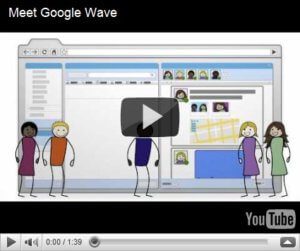I recently had an interesting exchange on Facebook with SharePoint MVP Rob Foster about Google Wave. For those not familiar with Wave, Google touted Wave as the next step in the evolution of asynchronous collaboration. Wave allows people to create threaded discussions with richly formatted text, photos, videos and more. Participants in a Wave discussion could inject content into any portion of the discussion and replay any portion of the discussion to catch up to parts they’ve missed. The following video does a nice job of highlighting Wave’s capabilities:

Ok, back to the point. Google recently announced that Wave would cease to be a product. However, Google further announced that the technology in Wave would make it into other Google applications and services.
The status of Google Wave is and its prospects for the future was the subject of my discussion with Rob. I have met Rob on several occasions and regard him as a fairly intelligent person, usually. That’s why I could not understand how he could assert that Wave was dead, both as a product and technology. Here’s our discussion thread…
Rob Foster, SharePoint MVP: The failure of Google Wave still makes me giggle.
Eugene Rosenfeld [Me] Not sure it has failed yet. The product may have died but the tech will live on. I think it will become a pervasive component of many Google products and services.
Rob: @Eugene, and how many companies are buying that BS? hahaha!
Me: You’re right. Probably only the companies that bought off on the notion that a search engine company could create a mobile device operating system to rival both Windows Mobile and iPhone OS. Oh wait, that happened
Chris B: I tried to like it but couldn’t.
John R: Google leaves everything in beta in case this happens. Google Wave and Google Sites were “SharePoint Killers” – Weathermen are more accurate.
Rob: Google is the SharePoint/iPhone/whatever killer just like Delphi was the VB killer of the late 90’s. One thing that will eventually catch up to them is that software companies are built by big businesses buying licenses for their products. Their business model isn’t in line with that minor detail.
BTW…@Eugene, my 6 year old could do a better phone OS than Windows Mobile. Love it or hate it, Apple’s closed model for software development (i.e. they approve every application) does aid in a high quality app store, whereas with an open model any shadetree programmer (aka “faker”) can release an app into the wild. I have a love/hate relationship with Apple’s model (speaking as an iPhone developer), but overall their apps are moderately stable in comparison to an open model.
Me: @Rob: “..software companies are built by big businesses buying licenses…” I think that CEOs of Salesforce.com, Facebook, and oh yeah, Google would disagree. The fact of the matter is that the notion of a “software company” no longer has meaning in our world. There are companies that sell capability through IT. Those companies may do so through software, hardware, services, or some combination.
As for my mobile OS comment, the point was not to compare the merits of the various OSes. Rather, the point was that Google was able to take on the major players in the smartphone OS market and start winning in an extremely short time-frame; Android is only in version 2.2 while WinMo is in 7 and iOS is in 4. In fact, according to Gartner, Android OS has surpassed iOS in market share. Will Google target SharePoint with their Wave technology? I don’t think Google has ever stated that publicly. Seems that the SharePoint community was the first to raise the idea. My gut is telling me that Google is going after Facebook, but that’s just a hunch.
Thomas H: I never got the appeal of Wave to begin with. I mean, the only way it would be useful is if everyone simultaneously decided to make that their choice platform of communication. There was no ramp up or adoption strategy as far as I could tell.
Me: @Thomas: I think you’re right in that the main reason Wave hit a trough was due to the adoption process, or lack thereof. It seems that Google treated Wave as a technology test rather than a new product roll-out. Hence my previous statement that although the Wave product is dead, the technology will be rolled into other Google products and services. I’m guessing that GMail and Talk will be one of the early targets.
What’s your take o Google Wave? Is it really dead as Rob states? Or will the other Google products soon get Wave-like capabilities? Comments welcomed, even Rob’s ![]() .
.

Google Wave is DEAD! I mean, it was cute for awhile and had some legs, but was never adopted by large corporations, which (for the most part) drive the economy of software.
BTW…blog response coming! 🙂
Rob
Bring it on, Foster!